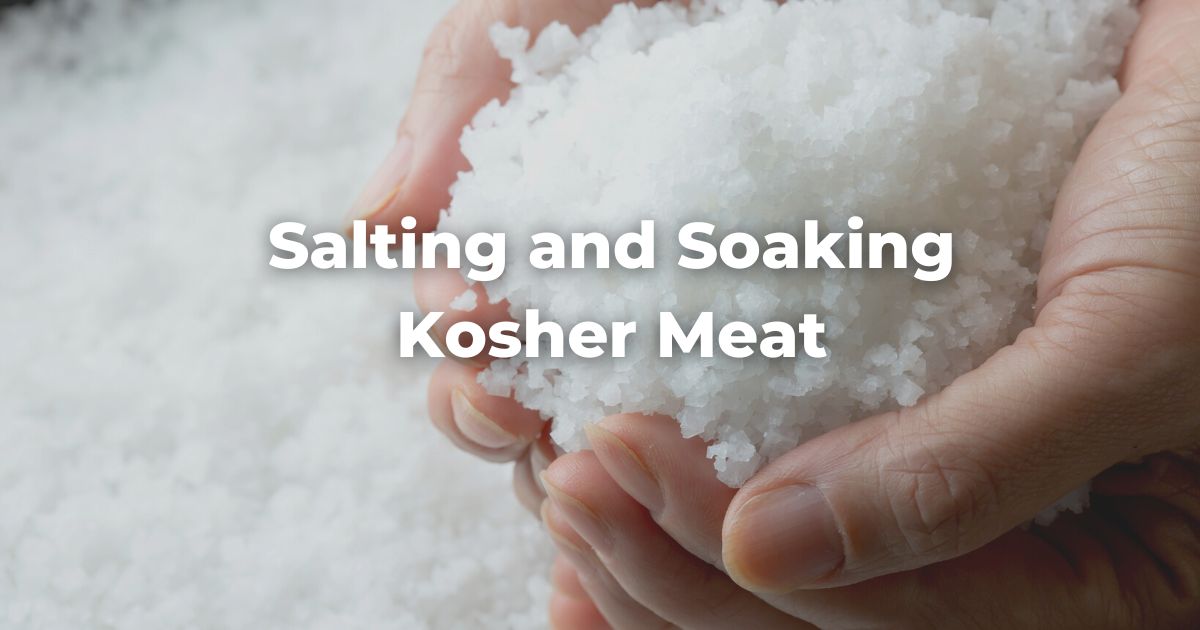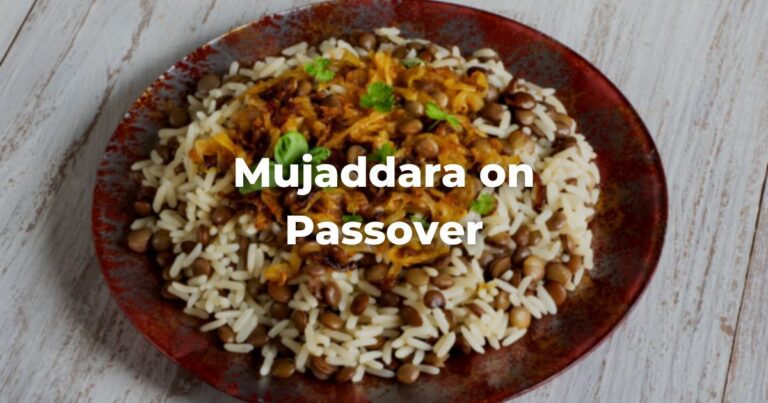After an animal has been butchered by a kosher slaughterer according to the norms and structures of the halakhah, the meat inspected, and the forbidden parts removed, the meat may still not be eaten until it undergoes a final procedure intended to remove as much blood as possible (to learn more about this requirement see this article).
To accomplish this, the meat is rinsed in cold water, then salted with coarse-cut salt (which should be called kashering salt or koshering salt, but has come to be known as kosher salt—a misleading term that suggests that there could be salt that is not kosher).
As noted above, this procedure is known as kashering the meat.
Butchered meat that has not been kashered must be washed down at least every seventy-two hours to ensure that any remaining blood does not dry into the meat.
When meat is transported before being kashered, washing stops are made on the road. All meat must be kashered before it is ground or chopped up into hamburger, and it is deemed highly desirable that meats be kashered before being frozen.
If meat is frozen before being kashered, soaking and salting should take place immediately upon defrosting.
In such cases, because the meat is not yet considered kosher, it may not be defrosted in a microwave oven. Instead, it should be defrosted in a refrigerator on pans or plates reserved for that purpose.
Most meat producers kasher the meat at the slaughtering plant, thereby eliminating the subsequent concerns relating to the transporting and freezing of the meat.
As a result, one would be hard pressed to find meat not fully kashered and ready for use in most kosher meat markets today.
However, there are some butcher shops that do sell kosher-slaughtered meat that has not been soaked or salted. Therefore, unless it is clearly labeled, it is important to ask specifically if meat one is about to purchase in a kosher facility has been kashered.
To kasher meat one needs the following items: a dedicated tub (or other vessel) large enough to place the meat fully inside it, a dedicated surface on which to salt the meat (usually a board with a grooved surface which allows the blood to flow away from the meat), and a sufficient quantity of so-called “kosher” salt.
The meat is soaked in cold water for thirty minutes, then rinsed fully with cold water. The salt is then spread liberally over the entire surface of the meat.
For poultry, the salt must fully cover both the inside cavity and the outside of the bird. The salt is left on the meat for an hour, and then the meat is thoroughly rinsed in cold water three times to remove all the salt.
(Coarse salt is specifically used because it is easy to remove by rinsing the meat. If done properly, the meat should not end up with a salty taste and the procedure should not impact individuals on low-sodium diets.)
Liver presents a special issue for kashrut observers because the soaking and salting procedure is not deemed sufficient to remove the blood.
One may, however, kasher liver by broiling it over a direct flame or on the broiler in an electric or gas oven. However, the grids or broiling pans must have holes large enough to allow the blood to drip out freely (Arukh HaShulchan, Yoreh De’ah 73:19).
Those who do not wish to rely on the rinsing procedure to remove all the salt may kasher other whole pieces of meat by broiling them as well.
(It is customary to wash the meat in cold water and to salt it with kosher salt before broiling, but that is not required.) After the meat has been broiled, it should be rinsed to remove any blood globules still clinging to the surface.
The utensils used for cooking such meat should be used only for that purpose, however.
Buying kosher meat is easier today than ever before.
(Even in communities where fresh kosher meat is not available, frozen kosher meat can generally be procured without difficulty. And, in places where not even frozen meat is available, the possibility of ordering kosher meat by telephone or over the Internet certainly exists.)
With the exception of raw liver, commercially frozen meat is almost invariably kashered before being frozen and therefore needs no further treatment before use.
Nevertheless, it is always best to check each package of meat to be sure that the meat has been appropriately soaked and salted.
When buying frozen meat, it is especially important to look for evidence that the meat was kashered before being frozen and packaged.
Clearly one must exercise great care when choosing a kosher butcher.
In addition to the natural integrity of an honest businessperson, a kosher butcher bears great responsibility toward the public and, as such, must display the finest moral qualities.
When looking for a butcher, one should be able to see evidence of kashrut certification clearly displayed, usually in the form of a letter. (Documents solely in Hebrew are rarely displayed in butcher shops outside of Israel. Consumers not fluent in Hebrew should be wary of signs they cannot read and not just assume that it “must” be the store’s certification document.)
One should certainly expect that a kosher butcher will be closed on Shabbat and major Jewish holidays.
All commercially prepared pre packaged meat should have proof of being kosher, and of having been duly soaked and salted, inside the plastic in which the meat is wrapped.
Adapted with permission from The Observant Life.
Authors
-

Rabbi Paul S. Drazen (1951-2018) spent two-thirds of his rabbinic career serving individual congregations and one-third on the staff of USCJ, all the while creating programs and educational opportunities to make Jewish observance and practice clear, accessible, and attainable for everyone.
View all posts -

The Observant Life: The Wisdom of Conservative Judaism for Contemporary Jews distills a century of thoughtful inquiry into the most profound of all Jewish questions: how to suffuse life with timeless values, how to remain loyal to the covenant that binds the Jewish people and the God of Israel, and how to embrace the law while retaining an abiding sense of fidelity to one’s own moral path in life. Written in a multiplicity of voices inspired by a common vision, the authors of The Observant Life explain what it means in the ultimate sense to live a Jewish life, and to live it honestly, morally, and purposefully. The work is a comprehensive guide to life in the 21st Century. Chapters on Jewish rituals including prayer, holiday, life cycle events and Jewish ethics such as citizenship, slander, taxes, wills, the courts, the work place and so much more.
View all posts







